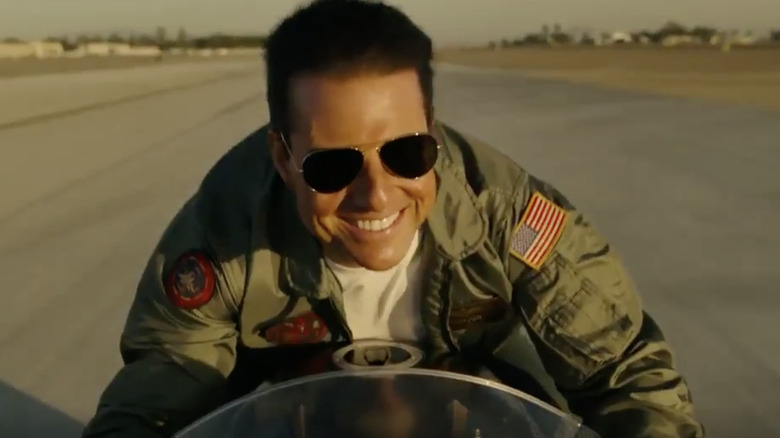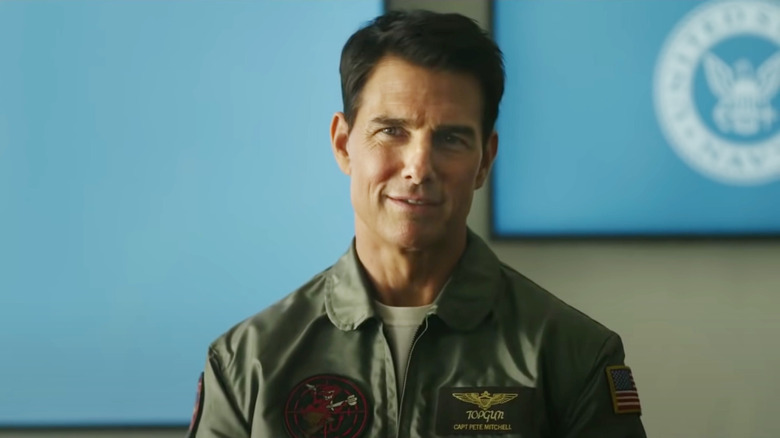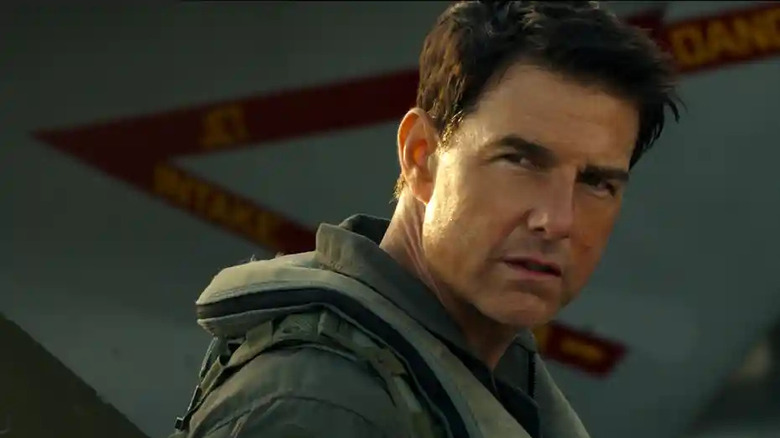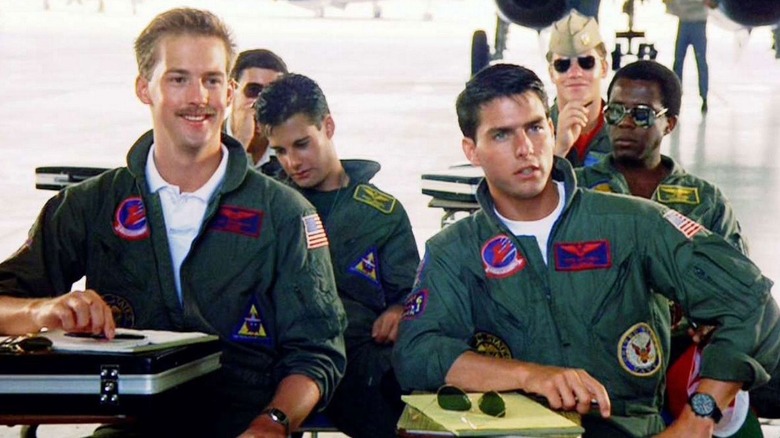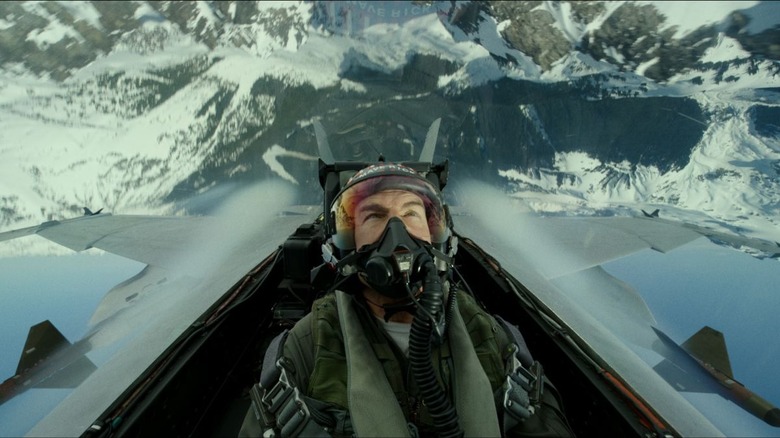A Real Psychologist Profiles Pete 'Maverick' Mitchell From Top Gun: Maverick
(Welcome to Pop Culture Psych Profile, where we speak with very real experts about what drives the very fictional heroes and villains in our favorite movies and TV shows. In this edition: Pete "Maverick" Mitchell from "Top Gun: Maverick." This article contains major spoilers for the film.)
Just as it was decades ago, the day has once again been saved by a rogue Navy pilot named Pete "Maverick" Mitchell. We'll refer to him solely by his call sign going forward. A lot of what happened is classified, but we managed to get access to a crystal-clear video debriefing (a shockingly well-edited one!) which pulled back the curtain on this controversial figure. Maverick has been working as a test pilot in the years since his initial success. He was recently called in to help train Top Gun pilots for a mission that could easily have gotten them all killed. He did get them out safely, but major risks were taken.
Maverick hasn't advanced much in rank over the years, and is still dealing with authority issues. In reviewing this classified information, we learned that his father, Duke Mitchell, died during a battle on the USS Oriskany. Reports given to the family at the time said he was at fault for his mission's failure, but CDR Mike "Viper" Metcalf revealed to Maverick that his father died as part of a heroic act that saved the rest of the mission's pilots. I've called upon psychologist Dr. J. Scott Jordan (also known by a call sign, Zombie Scotty), who also served in the U.S. Army, to break down the inner workings of Maverick.
The subject: Captain Pete 'Maverick' Mitchell
Maverick currently holds the rank of Captain in the U.S. Navy, serving as a test pilot and occasional instructor. He was expected to rise to the level of Admiral, just as his colleague and Top Gun classmate Tom "Iceman" Kazansky did. Instead, he chose to stay at a lower rank so he could continue to fly. Maverick has issues with authority, and routinely defies his superiors.
The choice to continue to fly indicates a risk-taking focus, which is reflected in Maverick's history. Even the death of his RIO LTJG Nick "Goose" Bradshaw in an accident didn't stop him from taking risks (though it delayed the behavior a bit). Maverick also has unaddressed grief for both his father and his friend, and a sense of parental responsibility for his friend's son, call sign "Rooster," who was part of his most recent mission.
Dr. Jordan says Maverick qualifies as an extrovert, which isn't inherently a bad quality, but can be an issue in a structured environment like the military. It has, however, calmed a bit over the years. Dr. Jordan explains, "He's never an introvert, but we do see him being more contemplative about his life and experiencing guilt that still hasn't gone away from Goose's death, and then from not allowing Goose's son to go into the Naval academy for four years. We see a more reflective Maverick later in life, but he's still an extrovert."
Should he have been put in charge of young pilots on a difficult mission? Let's take a look.
Basic behaviors
Maverick routinely baited those in authority as a young pilot, quipping where he shouldn't have, showboating in his jet, and disobeying orders. He pursued leisure activities without looking at the consequences. Dr. Jordan points out that years after the incident with his RIO, he doesn't join in these activities with the younger pilots. "He didn't join the guys playing pool. He didn't join the guys singing, whereas [earlier in his career], that was him. What one might like to say is he's an extrovert. He's an age appropriate extrovert."
So we're looking at growth here. This behavior is also noteworthy for what it reveals about a personality type Maverick does not have, according to Dr. Jordan. "It means that he's not a total narcissist. A total narcissist would make sure that they had to be the center of attention. They would have found a way to be at the piano singing, even though it may not have seemed age appropriate."
The root cause of it all
Unresolved grief, not just for Goose, but for his parents, is a big factor in Maverick's behaviors.
Maverick was traumatized after the death of his RIO, and Dr. Jordan explains that he is not only suffering because he was part of the death of someone, but because he knew the family. It does lead Maverick to promise Rooster's mother, another longtime friend, that he won't allow her son to be promoted. "Their possible lives as a family are dead. They're gone because of the things he did," Dr. Jordan says, explaining that grief doesn't have a treatment that makes it disappear. "That's how grief works. It doesn't go away. You learn to live with it. It doesn't really come back into his moment-to-moment thinking until he runs into Goose's son. Then all of a sudden, all of these things [are brought back up]."
"You learn to live with [grief] and you don't live with it by overthinking it," Dr. Jordan says. "You live with it by living a different life, and then incorporating that into this new life because one of the disservices our culture tends to do in these situations is just get over it. That's not how we work."
Adding to that is his father being gone and Maverick not knowing why. Dr. Jordan cites a study in neuroscience that says in simple terms, when an infant hears or looks at you, their brain tells their motor systems to repeat the action. It's automatic. Later on, that shuts down, and the brain inhibits you from mimicking (other than when you're drunk). It's how a child begins to break away from their parents. Maverick didn't have anyone to break away from in terms of a father figure, so he did a lot of these behaviors on his own, leading to his thrill-seeking actions.
The lack of a parental figure can actually create someone who is a risk-taker. "Being raised without someone that you work up against, who you can finally individuate from, if you don't have that, then there's a lack of individuation that can continue," Dr. Jordan explains. "I can see these people putting themselves in all kinds of situations where they have to prove themselves."
Also, keeping the cause of his father's death a secret made it something to rebel against. Dr. Jordan compares it to the experience of adoption: Telling a child early means it's just a part of their lives. "I think in a situation like Maverick's, if people are saying 'I don't want to tell. I don't want to tell,' then the person that's told knows it's traumatic or difficult for the person telling them and therefore, by default, labels it as difficult or traumatic. If you're hiding it, then it's never going to be anything but difficult for you when you tell them later. That difficulty is something they're going to experience in you. 'This is difficult. This is a big deal.'"
The diagnosis
Maverick is part of the military, and that can often mean suppressing your typical behaviors during basic training. Dr. Jordan tells us as a military man himself, this doesn't mean completely breaking down your personality, but doing it when you have to so that you can protect and serve. He says, "What happens in military training is the stakes are the highest possible stakes, and that is the lives of others. What the military really is after is your identity in that context being more and more about other people instead of yourself. That looks like you are breaking down individualism, yet at the same time, when people go home to their families ... they can be themselves, but in the military, because the stakes are so high, you have to be able to move quickly."
The idea is to minimize damage, and to be part of a team. He continues, "Your people are trained to be part of a team, yet they're also trained to understand leadership."
He concludes that Maverick is an extrovert bordering on narcissism, but not completely. He "does things that emphasize his individual identity more than the group identity until Goose gets killed ... later he tries to get a group of expert pilots who were like him to do what he wouldn't do when he was their age."
That diagnosis, however, is tempered by the fact that Maverick has grown as a person, finally dealing with, and more importantly, accepting his grief in the aftermath of the mission.
However, Dr. Jordan concludes, "He takes risks that put people's lives at stake for real ... I'd never want to be that commander who's got to ground him ... as a manager, if I've got someone who's putting the work environment at risk, regardless of their talent, I have to make an assessment. Are we better off without them, given the negative impact they're having on anyone else?"
It's clear that Maverick's actions saved many lives, but it would behoove us to keep an eye on his behavior in the future.
"Top Gun: Maverick" is in theaters now.
